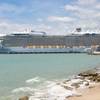Pew Disappointed by Chukchi Sea Drilling Approval
The federal Minerals Management Service gave the green light to Shell Oil's plan to drill exploratory wells in the waters of the Chukchi Sea off Alaska's northwest coast next summer.
"We are very concerned because drilling for oil runs the risk of devastating spills in a sensitive marine ecosystem already stressed by dramatic climate change," said Marilyn Heiman, director of the Pew Environment Group's U.S. Arctic program. "Careful scientific research should come before drilling in the Chukchi."
Shell purchased a swath of oil leases in the Chukchi Sea in 2008 when the previous administration opened up 30 million acres for drilling. Beginning in July 2010, Shell plans to drill three exploratory wells - the first time in 19 years that drilling will be allowed in the Chukchi Sea northwest of Barrow. The exploration program is a massive industrial undertaking requiring a 514-ft drillship, ice-breaker and support vessels.
"Exploratory drilling could have a significant impact on migrating bowhead whales and other marine mammals that are central to the Inupiat people's traditional way of life," Heiman said.
Drilling poses other dangers, the Pew Environmental Group said, including major oil spills in an extremely remote area where clean-up would be challenging if not impossible due to high winds and seas, frigid temperatures, long periods of darkness and broken ice. Shell's exploration drilling in the Chukchi will take place about 150 miles offshore, far from the infrastructure of staff, ships and clean-up equipment that would be quickly needed should a spill occur. According to the Pew, adequate technology to clean up oil in broken ice has not been proven to work in the U.S. Arctic Ocean.
"Oil drilling puts more pressure on a marine environment where walrus and ice seals and other mammals are already struggling because of rapidly melting ice," Heiman said. "We urge the Obama administration to take a precautionary, science-based approach to any new oil development in the U.S. Arctic Ocean to protect this vibrant place for future generations."
(www.pewarcticoceans.org)










